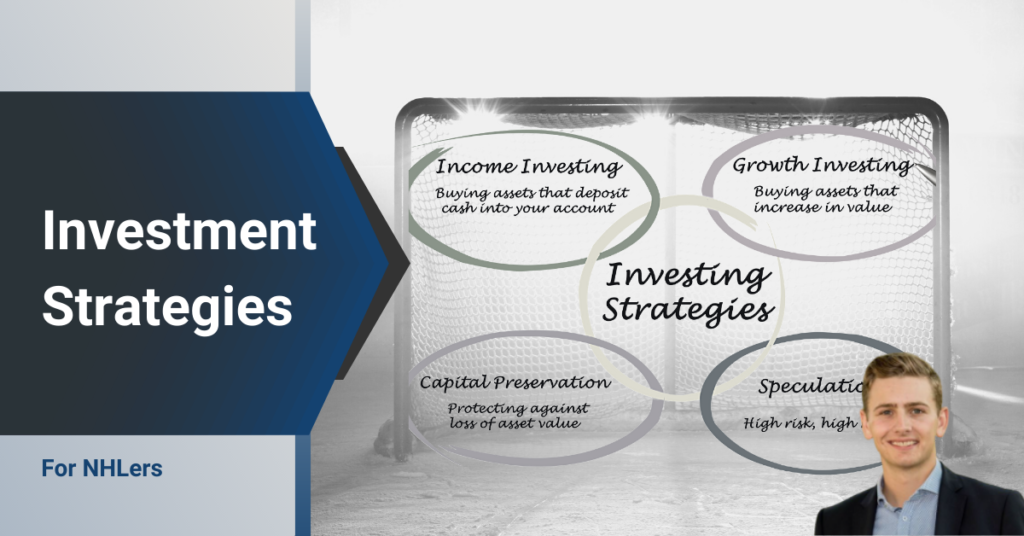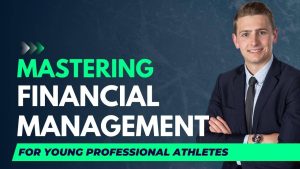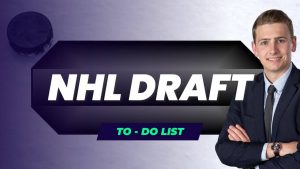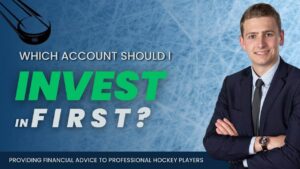[vc_row][vc_column][vc_column_text]
Investment Strategies for NHL Players
You’re playing in the NHL, so naturally you’re making a lot of money at a relatively young age. The average person will work for 25-30 years, and slowly increase their income as they get older. In contrast, an NHL career averages only 5 years, and is highly lucrative in that time. Since your career earnings structure differs drastically from the average person, your investment strategy will intuitively differ as well.
Step 1 – How much of your salary do you actually earn?
First, you must understand how much of your stated salary you’ll actually earn. The three expenses that will drastically reduce your income are taxes, escrow, and agent fees. In my article How much does an NHL player actually make I discuss in detail what these costs entail. For simplicity, the average player can expect to take home only 40% of their salary. For example, if TSN reports an AAV of $2.25 million, you should budget to have $900,000 in available spending for that year.
Step 2 – Establish a stable cash flow.
Once you have a firm understanding of your “net-income” after taxes, escrow, and fees, you’ll need to figure out how much you’re comfortable with spending.
Fancy houses and expensive vehicles are part of the lifestyle that comes with being a professional athlete, and you’ve worked hard to earn this lifestyle. However, take some time and do your due diligence prior to making these massive financial decisions. Banks and car salesmen will be more than happy to take your money, regardless if it puts you under financial strain. Whatever you do, ensure that from the very first paycheck you build a habit of stowing some cash away. The best way to guarantee your investments do poorly, is to not have any investments at all!
Step 3 –Build an Investment Portfolio
Once you’ve established the cash flow, and your savings account is growing each month during the season, we can begin building an investment portfolio.
There are two absolutely crucial advantages you have if playing in the NHL regarding your investment strategy:
1. Capital
2. Time
These are the two ingredients required to generate great investment returns, and if you’re 20 years old under an NHL contract you have both of them!
Here are some investment options to consider:
1. ETFs
-
- We’re strong believers in a passive investment strategy with a diverse exposure to the global stock market. There is no better, or cheaper way to achieve this strategy than using ETFs.
2. Alternatives
-
- As an accredited investor, you’ll have access to various alternative invest opportunities such as private debt and private equity. These have become the popular choice by many of the large institutions and pension plans in recent years, but are not available to the regular investor. This is a potential huge advantage from a wealth generation perspective, so ensure you choose an advisor who has access to these types of investments.
3. Real Estate
-
- Many of the players I know have benefited from using a real estate investment strategy. It works especially well if you spend your off-seasons in a city that has a professional team, because you can rent out your home or condo during the season while you’re away. Done properly, investing in real estate can be lucrative and can build your asset base. However, do your homework before getting involved because there are a lot of ways that a real estate venture can turn sour.
As I mentioned earlier, you have the advantage of time and capital on your side, so the best course of action is to build your investment portfolio as soon as possible and let your money get to work.
A word of caution: Be aware that there are literally thousands of investment opportunities available, and not all of them will make the most sense for your personal situation. One of the leading causes of financial distress for pro athletes comes from making uneducated investment decisions without consulting a professional. If any of this information seems foreign to you, give me a call at 204-223-2166 or send me an email via ahenry@harbourfrontwealth.com.
[/vc_column_text][/vc_column][/vc_row]




